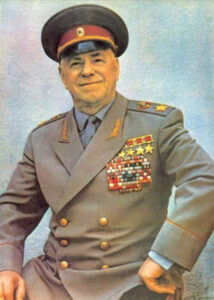In a comment to a recent post, our reader JMF made us aware of an article by the British newspaper “The Telegraph”, under the title of “Stalin ‘planned to send a million troops to stop Hitler if Britain and France agreed pact'”. We shell re-blog that article in full at the end of this publication, but first….
Reading the very first paragraphs caused raised eyebrows with The Shieldmaiden, who has studied the memoirs of Marshal Georgy Zhukov in great detail.
Papers which were kept secret for almost 70 years show that the Soviet Union proposed sending a powerful military force in an effort to entice Britain and France into an anti-Nazi alliance.
Such an agreement could have changed the course of 20th century history, preventing Hitler’s pact with Stalin which gave him free rein to go to war with Germany’s other neighbours.
The offer of a military force to help contain Hitler was made by a senior Soviet military delegation at a Kremlin meeting with senior British and French officers, two weeks before war broke out in 1939.
Secret?!!
It often happens, by the way, that most important documents are ignored by our historical researchers. Sometimes the thoughts and judgements on prewar years obtained from indirect sources and through supplementary research sound as a revelation, while the same thoughts and even facts are contained in books easily available in libraries.
Historians and writers of memoirs are fond of asking: “What would have happened if…?” Indeed, if the governments of Britain and France had agreed to join hands with the Soviet Union against the aggressor in 1939, as we suggested, the destiny of Europe would have been different.
— Georgy Zhukov, 1962
In his memoirs published in 1962, Zhukov talks about those negotiations and the British/French unwillingness to commit. This is not at all surprising – as we wrote earlier, at approximately that time Britain and France were themselves preparing to pounce on the USSR: England and France were preparing an attack on the USSR in the summer of 1940: Operation Pike.
We are going to reproduce the relevant passages from Zhukov’s memoirs, using the English translation of his “Recollections and Reflection”, volume 1, found at WebArchive. Volume 2 is also available there.
But first, there is another paragraph in “The Telegraph” that raised our hackles.
But the British and French side – briefed by their governments to talk, but not authorised to commit to binding deals – did not respond to the Soviet offer, made on August 15, 1939. Instead, Stalin turned to Germany, signing the notorious non-aggression treaty with Hitler barely a week later.
Notorious treaty?!!
Shouldn’t the British press rather call the Munich conspiracy of 1938 for “notorious”. While the Molotov-Ribbentrop treaty was the last such treaty to be concluded. From our Telegram post “All European countries signed pacts with Hitler!”
- Declaration on the Non-Use of Force between Germany and Poland, signed in 1934;
- The Anglo-German Naval Agreement of 1935, which gave Hitler the opportunity to have a navy, which was prohibited as a result of the First World War;
- The Anglo-German Declaration of Chamberlain and Hitler, signed on September 30, 1938;
- The Franco-German Declaration of December 6, 1938, signed in Paris by the French and German Foreign Ministers Bonn and Ribbentrop;
- The Treaty between the Republic of Lithuania and the German Reich of March 22, 1939, signed in Berlin, which dealt with the reunification of the Klaipeda Region with the German Reich;
- The Non-Aggression Pact between the German Reich and Latvia of June 7, 1939;
- These are only a part of the treaties concluded in pre-war Europe with Nazi Germany.
We also wrote in the post “Failed Union Against Fascism”
In 1934, the USSR invited European countries to jointly resist fascist aggression.
Their refusal made a new world war inevitable.
Doctor of Historical Sciences Mikhail Meltyukhov reflected on this in an interview with the magazine “Historian”:
The main reason for the failure of the “collective security” policy is that Great Britain and France were more inclined to agree with Germany and Italy rather than with the Soviet Union.
Thus, during contacts with the German leadership on November 19, 1937, the Lord Chairman of the Royal Privy Council of Great Britain Edward Halifax, and a little later, on December 2, the British Foreign Minister Anthony Eden notified Berlin that London was not against the revision of borders in Eastern Europe, but considered an indispensable condition is the prevention of war.
France supported this position during the Anglo-French negotiations, which took place in the British capital on November 28–30, 1937.
The parties agreed on further non-interference in international disputes [read: no support for the anti-fascist struggle against Franco in Spain] and clashes in Eastern Europe.
And now, to memoirs by Marshal of the Soviet Union, Georgy Zhukov, first published in 1962, English translation from 1985.
From chapter 8, “In Command of Kiev Special Military District”, pages 211 – 216 of volume 1
In reporting to the Party’s 18th Congress about the work of the Central Committee, J. V. Stalin commented on the threat of the new imperialist war. He said that our country, which constantly followed a policy of peace, was doing its utmost to enhance the fighting capacity of the Red Army and Navy. That was really so.
It often happens, by the way, that most important documents are ignored by our historical researchers. Sometimes the thoughts and judgements on prewar years obtained from indirect sources and through supplementary research sound as a revelation, while the same thoughts and even facts are contained in books easily available in libraries.
Continue reading

